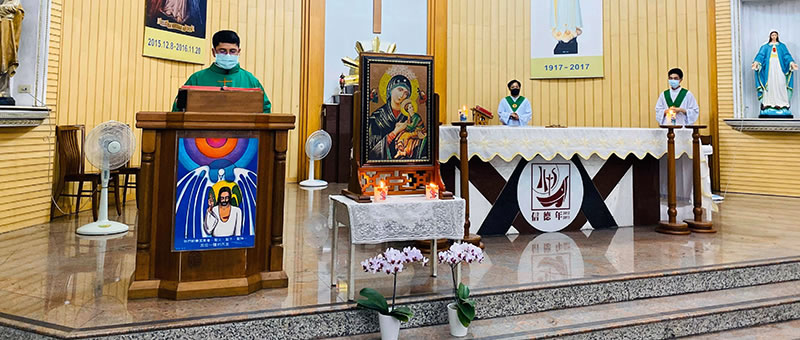
brokers system in Taipei
Prevention measures have been immeasurable since the disease became known. Since the start of the pandemic, the number of infected has been controlled. These measures have involved the ecclesial sphere as well. For example, Hisnchu Diocese, where Columban Missionaries do pastoral service, was the first to suspend Sunday Masses. And the use of masks, disinfectant alcohol of 75 degrees, control of body temperature, and social distancing have been necessary.
As a foreigner, at the beginning it was very uncomfortable to get used to the established requirements, especially the use of masks since I was not used to it. Furthermore, with the use of glasses, it wasn't easy to read. But over time, I got used to it since the use of masks was essential, even for Sunday masses, which were broadcast online and had no audience.
It was complicated to buy masks at the beginning; you could only buy two units per week, as long as you have the national health insurance card. Now I know you can buy 9 masks every two weeks; even in some businesses, you can buy them in boxes without any requirements, and other preventative products are available to everyone.

celebration for Aborigines
During my time at the Immaculate Heart of Mary Parish, in the city of Taoyuan, people have always followed the rules given by the government. At no time has there been conflict due to preventive measures. All people have collaborated in an exemplary way to prevent any contagion. Even from the beginning, all the parishioners who had traveled to other countries were recommended not to attend daily masses for at least fourteen days. The priority has always been that the people who came to the parish were safe.
Socially, life has not changed much. Public transport has been operating normally, the use of masks is necessary and the person who does not use it cannot board a train or bus, or they will be fined economically. Shopping malls and restaurants have also not closed.
Taiwan has not had a single day of quarantine. Preventive regulations continue to apply even if there are no infections. It is a way of seeing satiety where individual interests are suppressed for the welfare of the community. In addition, people trust in the authorities on duty.
Now local infections have been reduced; for the last 40 days, no local, new cases have been reported. The situation is normalizing little by little, and I hope that the reality of other countries will soon improve as well.
